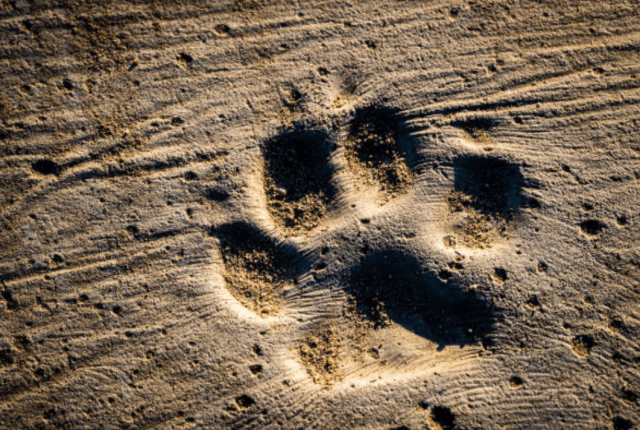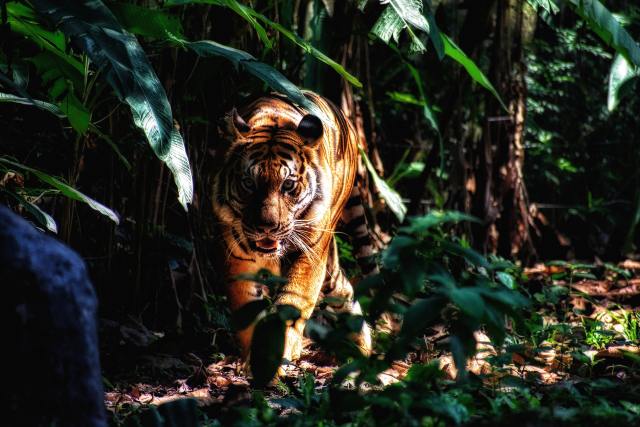[ad_1]
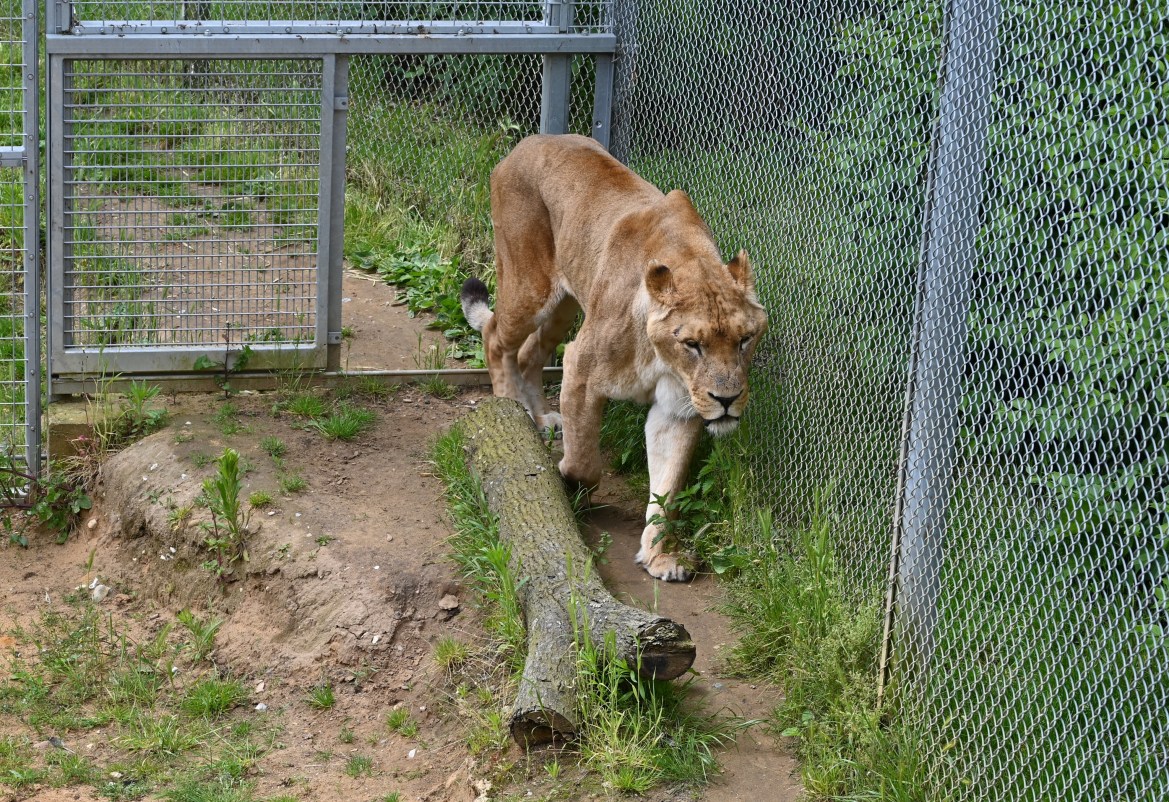
This buyer weblog put up was written by Shubhobroto Ghosh, creator of ‘Dreaming In Calcutta and Channel Islands’. Shubhobroto is the sooner coordinator of the Indian Zoo Inquiry enterprise and has attended the Tips and Adjust to Instructing course at Durrell Wildlife Conservation Notion. Shubhobroto accomplished his Masters thesis on British zoos on the College of Westminster and has labored on the Wildlife Notion of India, TRAFFIC India and is in the intervening time Wildlife Promoting and advertising advertising marketing campaign Supervisor at World Animal Safety.
Shadows of untamed selves
On the event of World Ambiance Day, 2024, discovering out the present discourse on wildlife conservation and environmental safety, makes me realise that captive animals have been given transient shrift usually. Patronisingly thought of in quite a few circumstances, taken as a right in others, wilfully misrepresented by a brilliant many establishments that maintain them and ignored in massive circumstances, for me, they proceed to be the unsung representatives of creatures who’ve misplaced their important attribute of wildness. Since I wish to handle animals as people, some reminiscences that cross my concepts appropriate now will illustrate how the plight of 1 life can reveal many elements of animal behaviour, human animal relationships and depict concepts on animal welfare and conservation.
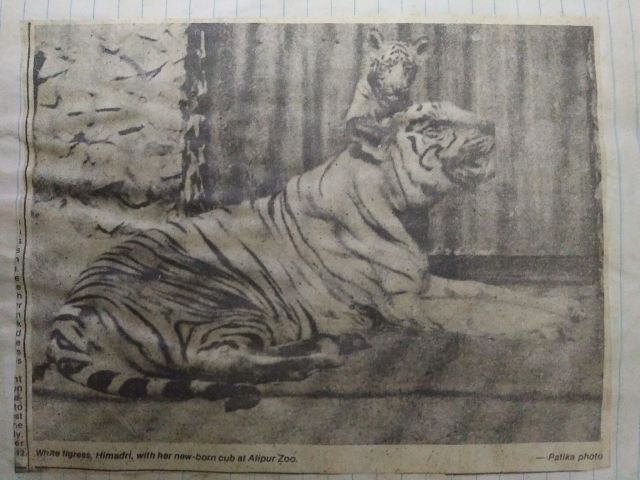
I’m sharing the story of is one captive tiger who made a deep have an effect on on me all via my childhood days, Himadri Junior, a white tigress in Alipore Zoo in Calcutta. A descendant of the well-known distinctive white tigers of Rewa in Madhya Pradesh, Himadri Junior was invariably the primary tiger I would encounter all through the sooner white tiger half in Alipore Zoo, a bit for which one wished to pay further to see these ethereally lovely creatures which have captured the creativeness of many zoo directors and mates alike.
It goes with out saying, legit factors is also raised on the fundamental goal of breeding white tigers or any massive cats in captivity, nonetheless as a toddler, I used to be not very aware of these elements. I would come all via Himadri Junior sitting at one nook of her cage, and her posture and place had been so predictable that I grew to grow to be used to this all via each zoo go to. She would be the first massive cat I would encounter all via my zoo visits and though she was a captive creature, she was my first psychological picture of a big cat anyplace. Her reminiscence stays to be etched in my concepts at present.
From out of the darkness
With the passage of time, I take a look at her offspring in Alipore Zoo and the large day when she bore a white cub and I assiduously collected newspaper clippings documenting the event. I furthermore later learnt that Himadri Junior had been mated with a wild caught tiger from the Sunderbans. As a toddler, I had imaginative experiences referring to Himadri Junior. I would think about her day-to-day routine and take into consideration the restricted space she occupied. I fairly usually deliberated on the thought of giving her further room to educate. I furthermore dwelt on the exact reality what she can be doing at evening and if she had any nocturnal instincts that is likely to be intact at evening and whereas I used to be asleep, whether or not or not or not she is also pacing the cage all through the darkness.
This was furthermore a flowery I developed referring to visiting a zoo at evening and observing the behaviour of assorted creatures by moonlight. Nonetheless, whereas a toddler, I seen the stark actuality of Himadri Junior being a caged animal and that her existence was principally disadvantaged of the pure patterns of behaviour that had been integral to wild tigers. Positively, all my ideas referring to Himadri Junior, had been juxtaposed in relation to what a wild tiger should be doing.
As I grew, really, I began zoos with a extra important eye. I started to take a look at their goal and their targets, nonetheless I actually not overpassed the fact that the person animals that I noticed incarcerated had their very private tales to inform. I actually not fell for the glib and faulty assertion, so beloved to many conservationists, that species are extra crucial than people. For me, my concern for zoo animals has all the time been deeply embedded in my affection for specific particular person animals of varied species, and definitely not in my life, until as of late, have I felt that the pursuits of people had been in any methodology at odds with the pursuits of species.
Seeing the person
As an illustration, when the primary giraffes acquired proper right here to Alipore Zoo in 1986 from Cologne Zoo, I went to see them with a deep seated specific curiosity with my mom, Chandana Ghosh, due to I had solely be taught extensively about giraffes until that point and had actually not seen one all through the flesh. Correct now, after visiting zoos all via three continents and having seen scores of giraffes in quite a few services, I nonetheless recall the picture of Sagar and Uttara, the primary giraffes I ever noticed.
Taking a look at them, questioning at their physique and subsequently elevating questions on their captivity have all been integral to my understanding of zoo animals. In exact reality, when Copenhagen Zoo in Denmark, took the savage choice to kill their two yr earlier giraffe, named Marius in 2014, I used to be reminded of my first encounter with Sagar and Uttara in Alipore Zoo and my instantaneous connection to them as people who I visited for quite a lot of years subsequently.
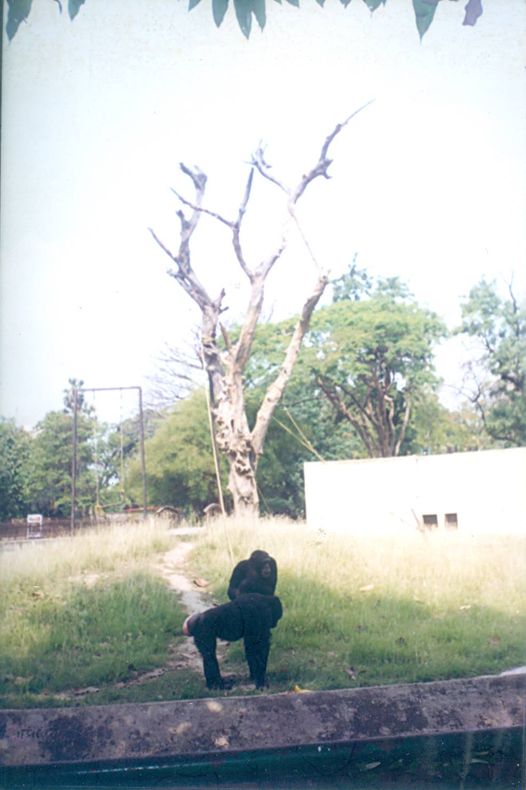
Utterly completely different reminiscences furthermore come to concepts. Watching Jessie and Tuzo, the chimpanzee couple at Alipore Zoo of their open air enclosure after their arrival from Twycross Zoo in Good Britain. That that they had been initially from Southport Zoo in Northern England, from the place they’d been despatched to Twycross Zoo and thence to Kolkata.
I’ve written about my expertise discussing them with the Southport Zoo director, Carole Petrie in December, 1999, all via my first journey to England. By the way in which by which, Southport Zoo was surveyed by stalwart zoo animal welfare specialist, Stefan Ormrod, ex Curator of Mammals at Jersey Zoo and head of the Zoo Course of Drive of Born Free Basis and World Society For the Safety of Animals. Due to Stefan’s investigation, mixed with these of assorted activists, Southport Zoo was ultimately closed in 2004. I used to be glad to have been a part of the campaigning course of that led to the closure of this zoo and even at present, I can consider the animals I noticed there all via my December, 1999, go to, significantly, the chimpanzees, a single lioness and two Snow Leopards.
One completely different notable inhabitant of Alipore Zoo stays etched in my concepts, Adwaita, the Aldabra Large Tortoise who was apparently Lord Clive’s pet, and is reported to have lived for spherical 2 hundred and fifty years prior to dying in 2006.
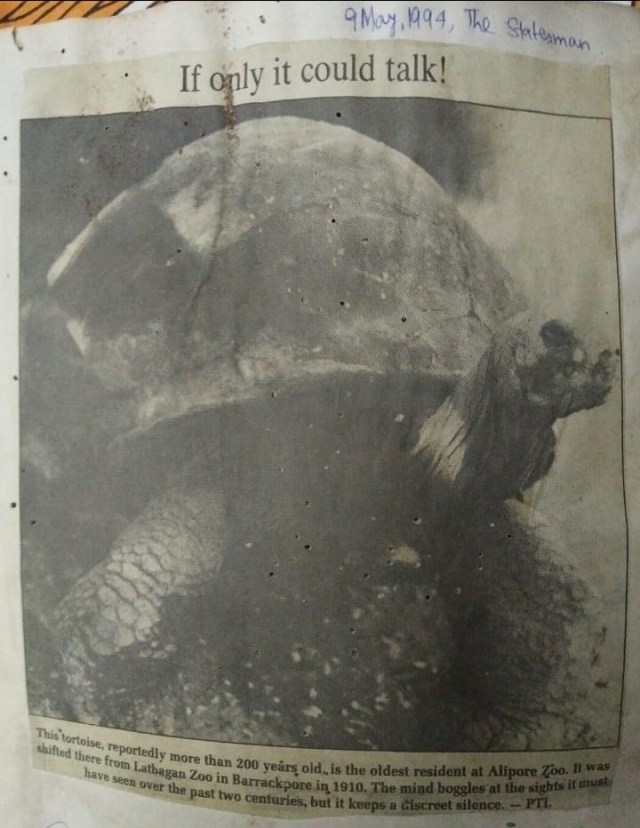
I’ve seen Aldabra Large Tortoises somewhere else and Adwaita has now been modified in Alipore Zoo with two new Aldabra Large Tortoises named Kotha and Koli, nonetheless his reminiscence stays very potent in my concepts nonetheless.
Disturbing actuality
In December, 2023, I used to be capable of go to Assam the place I spent two years of my life and had a risk to revisit Guwahati Zoo and Kaziranga Nationwide Park, that would probably be a UNESCO World Heritage Site. As a pupil in Guwahati, I spent days in Guwahati Zoo and returning after a extremely very very long time with my companion, Payel Biswas, I used to be capable of recreate the journey undertaken so quite a lot of years beforehand.
I remembered seeing Mohan, a lone White Rhino, who had flip into deranged by his captivity and used to bang his horns in opposition to the wall, with the highest consequence that they grew to grow to be pitiful stumps attributable to this fixed battering.
We had been furthermore capable of see Pygmy Hogs in Guwahati Zoo, the one zoo on the earth to accommodate his animal and topic of a captive breeding programme in Assam that’s assisted by Durrell Wildlife Conservation Notion, an establishment the place I studied wildlife administration and zoo animal welfare.
Visiting zoos internationally launched me to the disturbing actuality that many zoos are conduits to the wildlife commerce. Irresponsible zoos add to the issue of wildlife farming and the proliferation of captive animals meant for consumptive use and leisure.
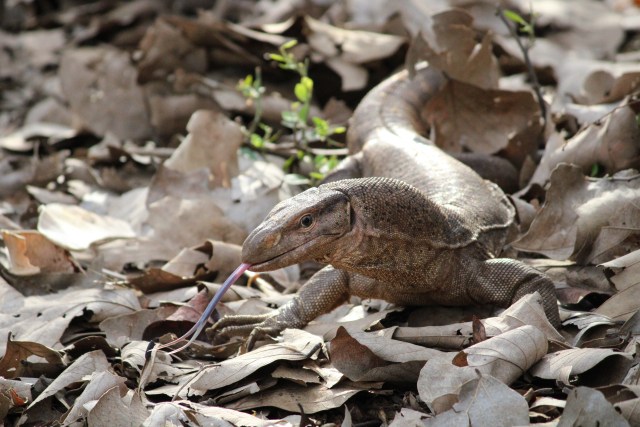
Wild animals endure in inappropriate circumstances in captivity and one stark quotation of this I deal with ceaselessly are the captive elephants in Jaipur in Amer Fort, giving rides largely to overseas vacationers, who consider using them presents a mode of India. The elephants of Amer Fort encourage unlawful wildlife commerce, abet animal cruelty and promote the thought animals are commodities.
Wildlife farming
Not too manner again , World Animal Safety has produced a report on wildlife farming that reveals an estimated 5.5 billion wild animals being saved in merciless circumstances on industrial wildlife farms world broad.
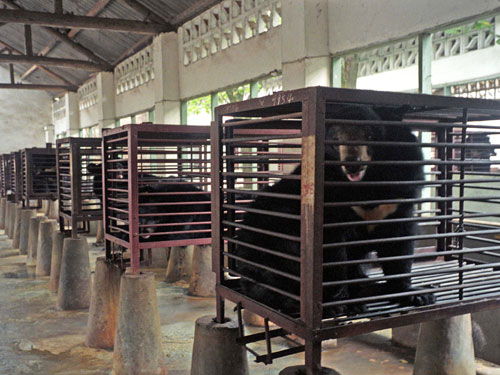
Researchers have discovered an astonishing lack of transparency and insufficient monitoring all via the worldwide multi-billion-dollar commerce, the place sentient animals are handled as mere parts in a merciless manufacturing line. Tragically, some captive wildlife populations are actually bigger than these residing free. The full report is also be taught correct proper right here.
More and more, influencers are talking in opposition to animal abuse in quite a lot of circumstances. Shreya Sen Handley, award worthwhile creator of the journey e-book, ‘Care for With Care,’ says, “It’s time to make cruelty free decisions in our life-style, avoiding the abuse of wildlife in leisure and choosing improvement merchandise that don’t abuse animals or exploit slave labour.” Shreya strives to make these modifications herself and hopes others will too, even when it isn’t all the time straightforward.
Talking of people, the lives of many sentient beings are destroyed in manufacturing unit farms the place animals are raised for meat. Elevating animals for meat in intensive circumstances destroys the habitat of untamed animals and presents room for human wildlife battle. World Animal Safety has been elevating the matter of manufacturing unit farming as a merciless apply by encouraging plant primarily based completely diets to handle animal cruelty and environmental destruction.
I furthermore really actually really feel very upset {{that a}} full species of animal, the Silk Moth, Bombyx mori, has been destroyed, devastated and mangled earlier creativeness for the luxurious product of silk that’s used to adorn human beings as an act of self-importance. For one pure silk garment in any case 25,000 to 30,000 silkworms and silkmoths are crushed to dying and boiled in most likely primarily probably the most barbaric approach.
Silk manufacturing exploits toddler labour in India and it is usually an environmentally damaging course of. With many different merchandise like plant primarily based completely silks making their presence felt available on the market, it’s time to flip into extra civilised and recognise the rights and sentience of invertebrate animals like silkworms and silkmoths who’re able to feeling ache and deserve the same stage of kindness and concern we accord to vertebrate animals.
Concerning cruelty in pure silk manufacturing, I’m most profoundly grateful to the efforts of my pal and colleague, Kate Stephenson (Kate on Conservation), creator and trustee of the Born Free Basis, in elevating consciousness on this type of animal abuse and selling decisions.
What may want been, and what nonetheless could presumably be
I am going as soon as extra to Himadri Junior, the white tigress, I used to stare upon in Alipore Zoo as a toddler. I now transmogrify her reminiscence with that of my first sighting of a wild tiger in Kanha Nationwide Park in Madhya Pradesh in India in 2010. My unalloyed pleasure in seeing this wild tiger made me shock how Himadri Junior would seem like all through the wild, like her ancestor, Mohan, a white tiger who was discovered all through the jungles of Rewa in 1951. Positively, Himadri Junior, Sagar and Uttara maintain my lodestars for cherishing the wild counterparts of tigers, giraffes and all animals the place they belong, all through the wilderness of their pure habitat.
With compassionate people (like Kate on Conservation), who go the additional mile by highlighting the plight of all animals all through the globe, I’m positive that eventually, we’ll develop an understanding of untamed creatures when no animal has to endure all through the wild like Himadri Junior, the white tigress did at Alipore Zoo in Calcutta in India, so quite a lot of years beforehand.
I furthermore acquired proper right here all via a most dear letter questioning the considered conserving animals in captivity, written by the ex Chief Minister of West Bengal, in 1975, on the event of the one hundredth anniversary of Alipore Zoo in Calcutta. The textual content material materials reads as follows :
Chief Minister
West Bengal
Message
“The celebration of the centenary of the Zoological Yard, Alipore is an event to ponder not how finest we’re able to maintain birds and animals in captivity nonetheless how we’re able to defend them of their pure habitat – in our forests and in nationwide parks. In exact reality, I’ve usually felt that we should always on a regular basis critically study whether or not or not or not we now need to perpetuate zoological gardens in the slightest degree. We could beautify them and make them partaking to mates, nonetheless the primary thought appears to me to be improper. Animals shouldn’t be saved confined, nonetheless fairly the environment. It’s a common cruelty to them, and the earlier it ends the higher. What we actually want and may plan for are protected forests and sanctuaries the place animals can roam free, and the place they’re secure. We have now now now some all through the nation. Probably a day will come when there shall be many extra, and we is not going to ought to maintain animals in captivity merely to fulfill our curiosity.
I congratulate the employees and the Committee of Administration of the Alipore Zoological Yard on this event, and hope they could proceed to handle the animals and birds all through the yard with the compassion that they’ve historically confirmed.”
– Siddhartha Shankar Ray, Chief Minister of Bengal from 20 March 1972 – 30 April 1977 in ‘100 Years of Calcutta Zoo (1875-1975). The Centenary Celebration Committee, Zoological Yard, Alipore, Calcutta(1975)’
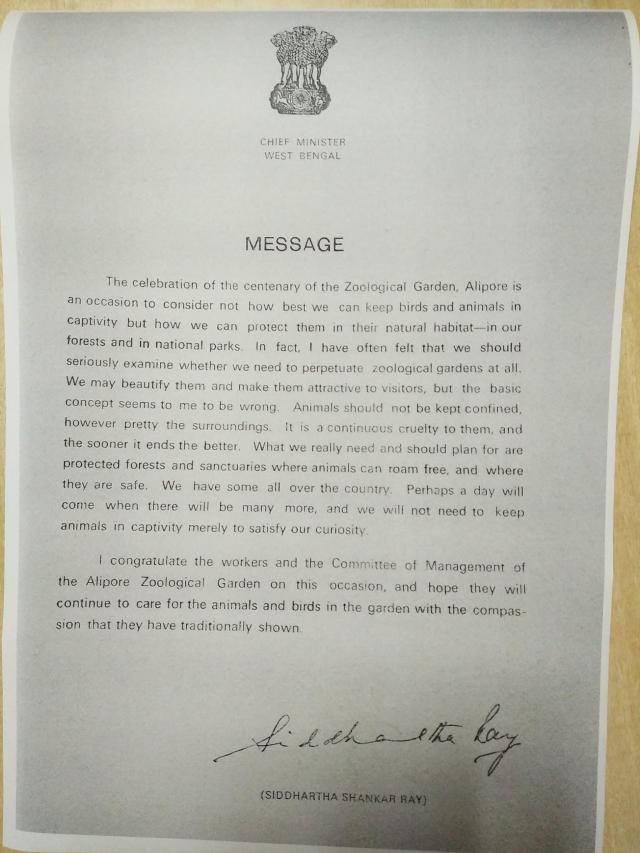
Written nearly fifty years beforehand, this message was far forward of its time and has a sturdy resonance with me in my present work, emphasising because of it did and does, that wildlife belongs all through the wild.
[ad_2]

